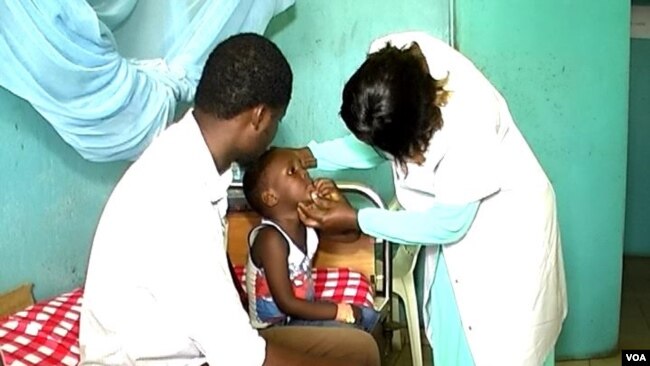
Cameroon Launches Vaccination Campaign to Contain Measles Outbreak
A mother comforts her 13-month-old baby in Kanuri, a language spoken in Meri, a commercial town on Cameroon's northern border with Nigeria. The 24-year-old mother says she hopes her child's life will be saved after inoculation against measles, as promised by vaccination agents deployed to her town.
Prosper Essomba is the Cameroon government's chief medical officer in Meri. He is supervising a vaccination campaign launched Friday against measles.
Essomba says he first inoculated his 1-year-old son to convince people that vaccination will protect their children from a measles outbreak. He says about 100 vaccination teams have been deployed in all villages around Meri to vaccinate all children with ages from 6 months to 9 years against measles and rubella. Essomba says about 67,000 children are targeted in the weeklong free vaccination campaign.
Essomba said vaccination teams have been sent to the Disarmament and Demobilization center in Meri. He said children of all people fleeing from Boko Haram strongholds on the border with Nigeria should be inoculated.
Yaya Ali, the highest government official in Meri says he asked the government of Cameroon to immediately organize vaccinations when more than a dozen cases of measles were detected in Meri within a week. He says the first measles case was reported in a 4-year-old child at the Disarmament, Demobilization and Reintegration Center at Meri. He says it is imperative for everyone to make sure that all children in Meri are protected by receiving the measles, mumps and rubella or MMR vaccine.

Ali said besides vaccinating children against measles and rubella, inoculation teams verify vaccination cards to make sure parents are keeping up with the vaccination schedules of their children. Essomba said it is important to administer all missed vaccine doses as soon as it is feasible.
Cameroon says several dozen measles infections have been reported within the past two weeks in nine other hospitals in Cameroon’s Far North region, where Meri is located. The government says many more people may be infected, since less than 30% of the population visits conventional health facilities. Read More…








